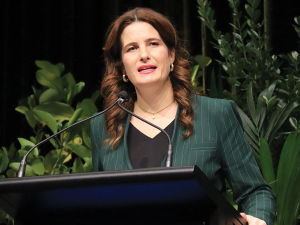Give us clarity! That's the plea from HortNZ to PM Jacinda Ardern and the Government.
Chief executive Nadine Tunley says Covid is here to stay and with vaccination rates increasing, the horticultural sector wants to know what the future rules of engagement will be, how they are expected to function and what the new normal will be.
Tunley says Covid has been hard on growers, especially those in South Auckland. She says the industry understands that lockdowns may continue for a while, but the sector wants answers beyond the daily or weekly briefings from Parliament.
Tunley says they want to know what the end game is going to be. She notes the initial handling of Covid by the Government was good, but says a change is needed now.
"We would be looking for a movement in the border arrangements because it's not just a matter of us getting labour in from overseas, it's also a matter of our business connecting with the world," Tunley told Rural News.
"We are going into our third season and not being able to meet personally with many of our customers, especially those in Asia and that is a massive challenge - relationships are so important. The fact is that other countries are getting there now to customers... We are lagging behind in this respec tand we need to accelerate the process of having greater ease of overseas travel."
Tunley says there is a need to be able to function normally and says Covid has affected the health of most people in the country in different ways.
"Covid hangover is real," she says.
For the hort sector, certainty is needed so that the industry can plan ahead. Tunley says the feedback of the daily or weekly briefings are irrelevant to a sector, which works on a much longer planning cycle.
"We plan in seasonal increments - 12 month windows and we overlay that with five and ten years - because we need to be able to plan our plantings and everything we do, well in advance," she adds.
"Our industry can cope with Covid but needs to know what the Government's plans are for the future to get a sense of comfort that it actually understands what we need to go forward."
Tunley says Covid has cost NZ a huge amount of money. She adds that businesses are very passionate about what they do but they can only help grow the economy if they have an insight into government thinking.
Listen To The Experts
Getting the whole of government, including politicians, to understand agriculture, is a challenge, says Nadine Tunley.
She says this is because it is such a diverse and complex sector. In her experience, some of the lower level staff in government ministries have a better understanding than some of those at the top.
She says growers and farmers understand the complexities of raising stock or producing vegetables and fruit. Their focus has always been on producing high quality, safe products and Tunley hopes that others in the supply chain have the same commitment to excellence.
"Government should not try to be the experts right across the agri sector," she told Rural News. "There has to be a level of trust that when farming leaders get up and tell ministers and officials what is happening in their sectors, the Government have to trust that advice."
Tunley says she finds it interesting that some ministers of the crown have quite strong views on various subjects and it's good to have an opinion.
"When I took on this role at HortNZ, I came there with a background that goes across many of the primary sectors - not just horticulture. It's not my job to impose my opinon on the sector.
"My job is to take the facts and information and understand what needs to be achieved and deliver the best outcome for my growers and try and implement that change, whether I agree with that change or not," she says.
"I think we have allowed far more personal involvement in politics than I would have expected."



















